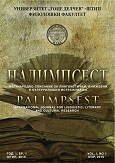RÉACTIVATION D’UN IMAGINAIRE DU XVIIIE SIÈCLE DANS LES ILLUSIONS PERDUES D’HONORÉ DE BALZAC
IN SEARCH OF A COLLECTIVE IMAGINARY OF THE 18TH CENTURY IN BALZAC’S LOST ILLUSIONS
Author(s): Miruna CraciunescuSubject(s): Cultural history, Studies of Literature, French Literature
Published by: Универзитет »Гоце Делчев« - Штип
Keywords: Balzac; salon; 18th century; journalism; patronage; collective imaginary.
Summary/Abstract: It is a well-known fact that Honoré de Balzac’s canonical novel, Lost Illusions, draws an ironic portrait of Paris’s literary scene. Writers are divided into two types. While the high-minded Daniel d’Arthez embodies the Romantic myth of the ill-fated poet, journalist Étienne Lousteau is characteristic of a new type of authors: one that is willing to trade the ever-lasting, post-mortem fame that fallows a life of sacrifice and poverty, for a career in journalism that guarantees not only material comfort, but also a short-run success. Lucien de Rubempré’s failure to succeed as a writer can be partly attributed to the fact that he fits into neither of these categories. In this essay, I claim that Lucien’s failure can also be explained by the protagonist’s obsolete desire to break through by integrating the Parisian aristocratic elite, at a time when the press already offered authors a much greater visibility than the salon ever could. This paper thus aims to explore the problematic relationship between French litterateurs and elites in the years 1820’s to 1830’s. It argues that Balzac’s parodic depiction of a failed poet’s career in Paris reveals a deeper anxiety concerning the disappearance of the salon as a mode of literary legitimization characteristic of the Ancient Régime, in favor of the press.
Journal: Палимпсест, Меѓународно списание за лингвистички, книжевни и културолошки истражувања
- Issue Year: 1/2016
- Issue No: 1
- Page Range: 135-148
- Page Count: 14
- Language: French

